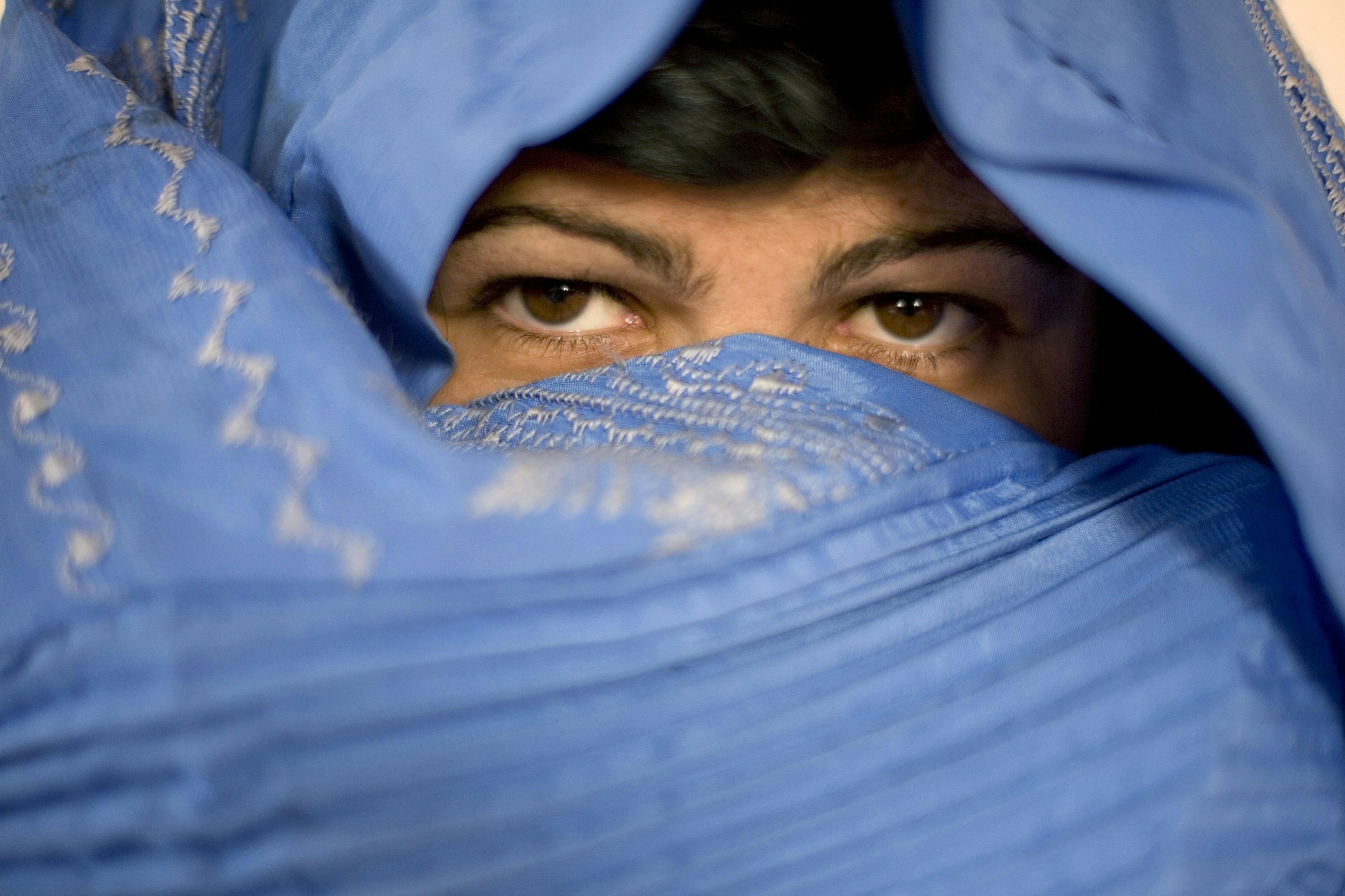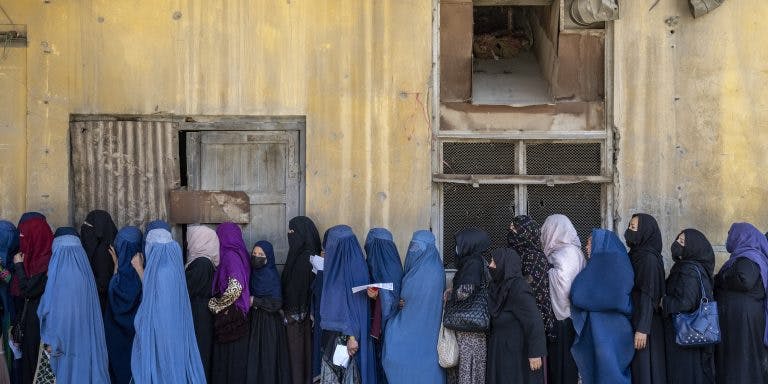In the two and a half years since the Taliban takeover of Afghanistan, the rights of Afghan women and girls continue to be severely restricted by the Taliban government, conditions which have been described by some international legal experts and human rights defenders as amounting to institutionalized gender apartheid.
According to a new report released earlier this week by the United Nations Assistance Mission in Afghanistan (UNAMA), the Taliban is enforcing further restrictions on Afghan women who are unmarried or do not have a male guardian, also known as a mahram. The further restrictions compound the already desperate situation of Afghan women and girls, reinforcing their progressive exclusion from society.
Edicts issued by Taliban authorities have curtailed women’s freedom of movement, attire, and behavior, as well as their access to education, work, health and justice. Those suspected of defying the edicts have been met with harsh enforcement measures by Taliban authorities, including arrests, detention, interrogation, and torture.
According to the new UNAMA report, authorities with the Ministry for the Propagation of Virtue and the Prevention of Vice, as well as its respective departments at the provincial level, have assumed an enforcement role regarding the wearing of a “proper hijab,” mahram, and other restrictions imposed on Afghan women. These authorities visit public spaces, offices, and educational institutions and have established checkpoints to monitor women’s compliance, including instructing bus drivers that they are prohibited from allowing women to board without a male guardian.
The report also details how women have been impeded from working or accessing basic services, including healthcare, due to the restrictions and enforcement measures. In December, officials from the Propagation of Virtue and the Prevention of Vice prevented women without male guardians present from accessing health facilities in Paktia province in the eastern part of the country. Instances were also reported of women being banned from work, while their male counterparts were allowed to continue working, as well as one case where officials informed an unmarried female staff member at a healthcare facility that in order to continue working, she must get married, or risk losing her job.
These cases demonstrate how the overlapping nature and intersection of decrees can further limit women’s rights and ability to participate in public life, even without the imposition of an explicit ban. For example, despite the fact there is no general ban on women’s work, the mahram requirement can still restrict a woman’s ability to work if she does not have a male relative to accompany her to her workplace.
Amidst these further restrictions – and perhaps exemplifying their extent – large numbers of Afghan women and girls were reportedly arbitrarily arrested, detained, and lashed in mid-January over alleged non-compliance with the Taliban’s hijab rules. The arrests reportedly included girls as young as sixteen, who were detained in shopping centers, classes, and street markets across Kabul. The girls were accused by Taliban authorities of “spreading and encouraging others to wear a bad hijab” and wearing makeup. Girls who were arrested described beatings and lashings carried out against those who attempted to resist or reason with authorities, with one girl attesting that her father was also subsequently beaten by Taliban authorities for raising “immoral girls,” according to interviews conducted by The Guardian.
The enforcement operations appear to be disproportionately impacting religious and ethnic minority communities, according to UNAMA. Even when families are able to secure their release, the detention of women and girls can often beget further isolation and even physical violence upon their return home. According to the UN Secretary-General’s Special Representative for Afghanistan and Head of UNAMA, Roza Isakovna Otunbayeva, “[d]etentions carry an enormous stigma that put Afghan women at even greater risk.” Moreover, the current crackdown pushes women and girls into greater isolation due to their fear of arbitrary arrest and detention and creates a seemingly permissive environment for men to enforce oppressive measures in the home.
The increased restrictions and their harsh enforcement by Taliban authorities will continue to exacerbate the burgeoning mental health crisis among Afghan women and girls. Data collected by healthcare workers from public hospitals and mental health clinics from across a third of Afghanistan’s provinces between August 2021 and 2022 showed a sharp increase in the number of women committing or attempting suicide. Due to the stigma around suicide in Afghanistan and reports that the Taliban has barred healthcare workers from sharing updated statistics, the data is believed to be a severe undercount by experts.
Many have linked the restrictive policies by Taliban authorities to the increased rate of suicide among women, compounded by other issues such as widespread food insecurity, poverty, and systemic domestic violence and forced marriages. Moreover, peaceful public demonstrations by Afghan women demanding the restoration of their rights have been met with brutal repression by the Taliban, including excessive force, intimidation, sexual and gender-based violence, torture, and even death. Although women have adapted their protest movements online to adapt to the crackdowns, some activists still fear that waning international interest will make women feel that continuing their acts of protest has become a futile endeavor.
The plight of Afghan women and girls has remained a fixture of the international debate around normalizing relations with the Taliban. Its central feature – whether the international community should increase engagement with the Taliban to address the multifaceted issues facing Afghanistan – manifested during a UN Security Council briefing in late December. Special representative Roza Isakovna Otunbayeva argued that the international community should increase its direct engagement with Taliban authorities, stating that “[d]ialogue does not legitimize.” Despite Taliban authorities maintaining that their restrictive edicts on women and girls are an “internal issue,” the special representative emphasized that UNAMA has had successful interactions with Taliban authorities on other issues such as climate change, microfinance, counter-narcotics, and drug addiction. For several stakeholders, including Afghan civil society representatives and the United States, there can be no significant steps toward the normalization of relations with the Taliban until women and girls are provided with meaningful access to education, work, and other aspects of public and social life.
Some countries, including Saudi Arabia, Qatar, and Türkiye, have moved toward what some experts have called “soft normalization” of the Taliban regime, and China and Russia have also taken steps toward establishing ties with the group. Some analysts have listed regional security, counterterrorism objectives, and humanitarian concerns as requiring more engagement with the Taliban, particularly as its rule seems likely to endure for the foreseeable future. Yet, the Taliban’s efficacy in combatting terrorism in Afghanistan, as well as its overall contribution to regional security, has continuously been questioned. During the December UN Security Council briefing, the representative of Ecuador stated that under Taliban rule certain terrorist groups have attained greater freedom of action, increasing the threat to neighboring countries.
As these international debates continue, and the Taliban escalates its repression, the situation for women and girls seems likely to worsen.
Bottom Line Up Front
- The Taliban is enforcing further restrictions on Afghan women who are unmarried or do not have a male guardian accompanying them, including restricting access to work, travel, and healthcare services, according to a new UN report.
- Amidst the renewed crackdown, Afghan women and girls have reportedly been arbitrarily arrested, detained, and lashed over alleged non-compliance with the Taliban’s hijab rules.
- A mental health crisis among Afghan women, including a sharp rise in suicides, has been exacerbated by the severe restrictions on women’s and girls’ rights and their progressive exclusion from public life.
- The plight of Afghan women and girls has continued to be a fixture of the international debate around normalizing relations with the Taliban.
Read original Soufa Centre post HERE. AP Phot /Ebrahim Noroozi

